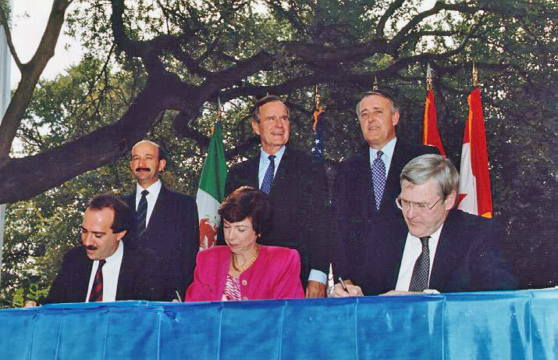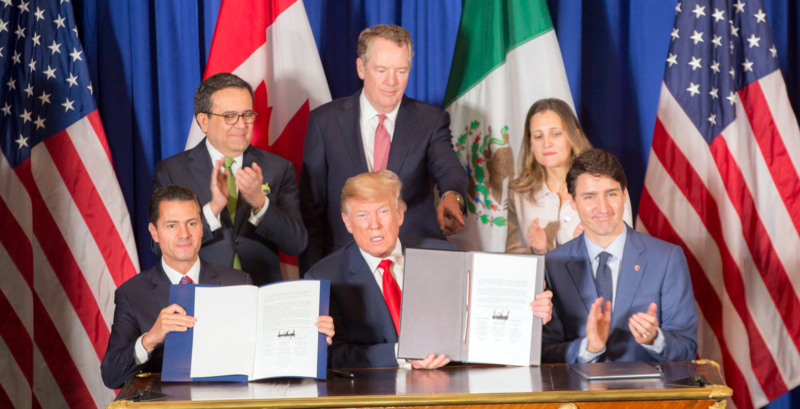
What are the Best Options for Modernizing NAFTA?
How significant of a priority should strengthening NAFTA be as compared to other trade agreements?
A Daily Publication of The Dialogue
Nearly a year after U.S. President Donald Trump’s administration reached a trilateral agreement on the United States-Mexico-Canada, or USMCA, trade pact, the U.S. Congress has yet to ratify the deal. Meanwhile, the U.S. manufacturing sector saw the worst reading in 10 years, and Mexico’s manufacturing sector ended the third quarter with its worst performance in eight years, according to an IHS Markit survey. How likely is the U.S. Congress to approve USMCA this year, and what sorts of complications would pushing its ratification into 2020 bring? How are political dynamics affecting the deal’s passage? If the trade pact is delayed further, to what extent will North America’s manufacturers suffer?
Jim Kolbe, senior transatlantic fellow at the German Marshall Fund of the United State and former Republican member of the U.S. House of Representatives from Arizona: “When negotiations were completed for the USMCA, most supporters breathed a sigh of relief. Such relief was premature. While Mexico and Canada moved swiftly toward approval, the process soon stalled—or slowed to glacial speed—in the United States. The reason? The convoluted process for approval by Congress requiring agreement on the provisions before the text is submitted to Congress for an up or down vote. With Democrats in control of the House, there are some who don’t want to give this president a victory on any trade agreement. For others, there was a genuine concern over the labor provisions and whether the Mexican government’s budget was sufficient to ensure adequate enforcement. Fortunately for the USMCA, while much of the administration has been in open warfare with Congress, the USTR—Ambassador Robert Lighthizer—has cultivated a positive working relationship with key Democrat leaders in the House and has been transparent in attempting to resolve Democrats’ differences over the provisions. Now, however, the impeachment imbroglio raises another barrier to approval of the agreement. Will the House leadership want to take up a trade agreement in the midst of impeachment proceedings? Will they carve out time to get it done before the end of 2019? If submission of the text or a vote in the House is delayed until 2020, the prospects for passage in an election year will be significantly dimmed. In that event the question is reduced to whether the president attempts to initiate a withdrawal from the existing NAFTA agreement. Were that to happen the consequences for the economies of Canada, Mexico and the United States, the largest three-way trading agreement in the world, are likely to be catastrophic.”
Arturo Sarukhan, board member of the Inter-American Dialogue and former Mexican ambassador to the United States: “The Democratic working group on USMCA recently provided the U.S. trade representative a counteroffer for how to address its concerns, and hopefully the USTR will revert when Congress returns from recess next week. Enforceability of the agreement is undoubtedly at the center of Democrats’ worries, and this explains the congressional delegations that have recently traveled to Mexico—including one by Ways and Means Chairman Neal—and AFLO-CIO president Trumka’s trip to meet with President López Obrador and discuss Mexico’s budgetary commitments to ensuring implementation of the country’s landmark new labor law. The problem, however, is that with an even more polarized landscape in Washington as a result of impeachment investigations into Trump’s diplomatic malfeasance and political-electoral vandalism, the rhetoric.about Speaker Pelosi now emanating from the Oval Office is clearly unhelpful and counterproductive. That it also aligns with the accusations leveled by GOP Senate and House leaders who—in an effort to pressure the Democratic leadership— have said the speaker was purposely delaying a vote, ensures that two wild cards threatening ratification remain in the deck. First, when, or if, the agreement will be ratified, depends heavily on the speaker’s willingness—and electoral calculations—to bring it up for a vote. Clearly, she understands that Democrats cannot afford to be seen as the responsible party for USMCA’s defeat, particularly in states that they will either need to win or remain competitive in for 2020. Why alienate her and scupper the possibility of a potential early November vote? Second is President Trump’s willingness to announce a withdrawal from NAFTA as a means of pressuring Congress to act. While the president has been silent on the issue of late, this gambit is still on the table, particularly if USMCA implementation legislation doesn’t reach Congress in the next two to three weeks.”
Michelle DiGruttolo, senior managing director, and Miyako Yerick, senior associate, both at Ankura Consulting Group: “The USMCA is stalled in the U.S. Congress, but the House has little incentive to move it along. The dynamics around the impeachment inquiry are already affecting talks, and pundits argue that impeachment could drain all the political energy in Washington, leading to legislative paralysis. Vice president Pence has already begun campaigning on the message that the ‘Do Nothing Democrats’ are stalling important legislation such as USMCA, hoping it resonates in areas that Trump won in 2016. But, given that the Democrat-controlled House has already passed more than 50 bills, including a budget, they have little political incentive to ratify the agreement that would give Trump a win. They will likely counterspin the message and make it about Mitch McConnell’s ‘Grim Reaper’ persona in the Senate graveyard, where bills go to die. As long as Democrats feel they have the upper hand, they will continue to stall, and the USMCA will creep along at glacial pace. The Mexican government released an initial budget last month that decreases previous spending levels for labor rules enforcement, making it even more unlikely it will pass this year. Further speculation as to the diminishing likelihood of passage is the fact that we have seen no resolution on environment rules or prescription drug provisions. Both Democrats and Republicans have said that if the USMCA does not get passed by November or December of this year and gets pushed to 2020, ratification is unlikely until after the election, and then passage would depend on who is elected president.”
Tamara Kay, associate professor of Global Affairs and Sociology at the University of Notre Dame’s Keough School of Global Affairs: “With an impeachment inquiry underway in the U.S. House of Representatives, U.S. and Mexico manufacturing faltering and President Trump’s trade war with China and other countries creating economic and political instability, the likelihood that the U.S. Congress will pass the USMCA this year is dwindling. The primary reason the NAFTA reboot will likely not see the light of day is political. House Speaker Pelosi and the Democrats do not want to hand President Trump a victory on NAFTA before the 2020 elections. If Trump doesn’t deliver on NAFTA, the Democrats’ mantra going into 2020 is that the president, who promised to renegotiate or terminate NAFTA and who claims to be a great dealmaker, failed. But given the political turmoil and damage this administration is wreaking on the nation, the Democrats may also be gambling on the possibility that the Republicans will lose the presidency and possibly even the Senate in 2020. If that happens, they will be in a much better position to renegotiate a significantly stronger NAFTA revision than the current USMCA. Although the Democrats are using the USMCA as a political football, their concerns about its current form are real. For more than 25 years, key Democrats, labor unions and environmental and consumer organizations have advocated for a fair trade policy that incorporates ‘swift and certain enforcement’ of labor and environmental standards in trade agreements. The USMCA’s enforcement provisions are sorely lacking. Moreover, the USMCA would allow pharmaceutical companies to price-gouge consumers for medicine. If Democrats gain control of the White House and Senate, the political dynamics of a revised NAFTA would shift dramatically.”
The Latin America Advisor features Q&A from leaders in politics, economics, and finance every business day. It is available to members of the Dialogue's Corporate Program and others by subscription.
How significant of a priority should strengthening NAFTA be as compared to other trade agreements?
How will the change affect the countries’ trade relationship? What will be the economic impact in the United States and Mexico?
Michael Shifter fue entrevistado por Gerardo Torres de El Salvador sobre los temas más destacados en la agenda regional. Entre otros asuntos, Shifter habló sobre el futuro de la paz en Colombia, la crisis política y económica en Venezuela, y el impacto de las elecciones de Estados Unidos en la región.
 Photo Credit: Mexican Government
Photo Credit: Mexican Government

